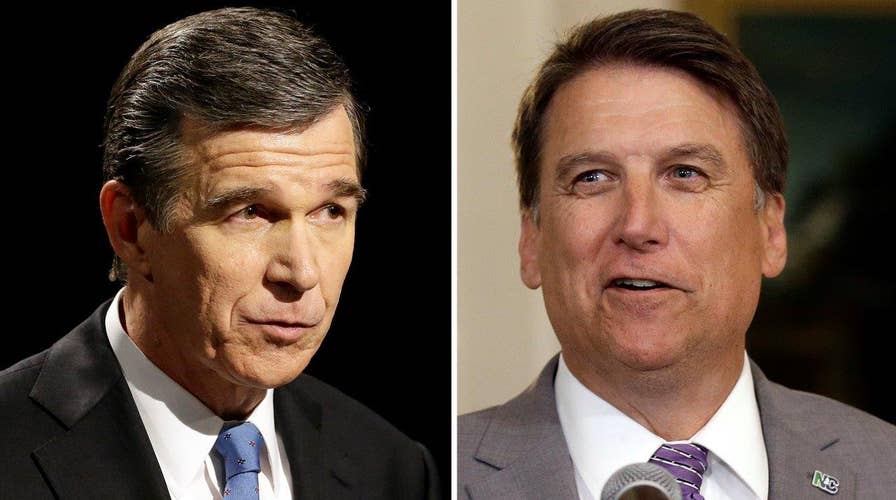GOP incumbent faces tough challenge in NC gubernatorial race
Jonathan Serrie reports from North Carolina
Poll margins are too close for comfort in the swing state of North Carolina, forcing candidates in several races to campaign into the 11th hour for support in the coveted battleground.
Donald Trump has scheduled an afternoon campaign event at the North Carolina State Fairgrounds in Raleigh. Hillary Clinton plans to appear with singer Madonna during a midnight rally at North Carolina State University.
Monday morning, Quinnipiac University released a poll with Hillary Clinton leading Trump by just 2 percentage points (47 to 45) — a statistical tie.
Races for governor and U.S. Senate are also tight in the state. The Quinnipiac Poll shows incumbent Sen. Richard Burr, R-N.C. and Democratic challenger Deborah Ross tied at 47 percent. In the gubernatorial race, Democrat Roy Cooper leads Republican Gov. Pat McCrory by 3 points (50 to 47 percent).
"North Carolina is a swing state, but in many ways it is a Republican swing state to lose,” Jason Husser, a political science professor at Elon University, told FoxNews.com. “In order for a Democrat to win North Carolina, it has to be a particularly bad year for Republicans."
The Senate candidates have accused each other of being rubber stamps for problematic presidential candidates at the top of their respective party tickets. But controversial legislation at the state level may also have an up-ballot effect.
McCrory, who came to office as a business-friendly moderate in 2013, has seen his reelection bid turn into a virtual referendum on the state’s voter ID law, which was tossed out by a federal appeals court, and House Bill 2 — a law that banned transgender individuals from using government building restrooms that correspond to their gender identity.
“He has been associated with the most visible, and the most controversial, issues — rather than the legislature where all of this stuff got passed,” said George Peery, Mars Hill University professor emeritus.
Signed by McCory in March, House Bill 2 caused friction among two key Republican constituencies. Social conservatives rallied around the law, which they said protected women and children from sexual predators. But HB2 alienated many fiscal conservatives in the business community because of the negative economic consequences it caused.
PayPal and other businesses have canceled expansion plans in the state to protest HB2. The NBA, ACC and NCAA have also moved some high-profile games out of the state.
In the presidential race, Trump will need the support of both fiscal and social conservatives. Meanwhile, Clinton will need to rally African-American voters to the polls, whose numbers were down during the first week of early voting.
And both campaigns have been making appeals to military voters. North Carolina is home to more than 99,000 active-duty service members and more than 775,000 veterans.
“In North Carolina if you’re not in the military, you either used to be in the military or you’re related to somebody who used to be in the military,” said Patricia Murphy, a columnist for The Daily Beast and Roll Call. “So, all of these issues — whether we’re going to be fighting against ISIS, national security issues, military spending in particular — are very much on the minds of North Carolina voters.”
In a battleground state where Barack Obama beat John McCain by just 14,000 votes in the 2008 presidential election and then lost to Mitt Romney by 97,000 votes four years later, relatively small groups of voters can make a difference.
Mauricio Castro, who organizes a non-partisan effort to get immigrants involved in the political process, said 25,000 new Latino voters have registered in North Carolina during this election cycle.
“We have enough Latino eligible voters today to decide an election for governor, for senate and even to win the presidential elections,” he said. “It doesn’t take more than 14,000 votes to be able to win it.”
Fox News’ David Lewkowict contributed to this report.





